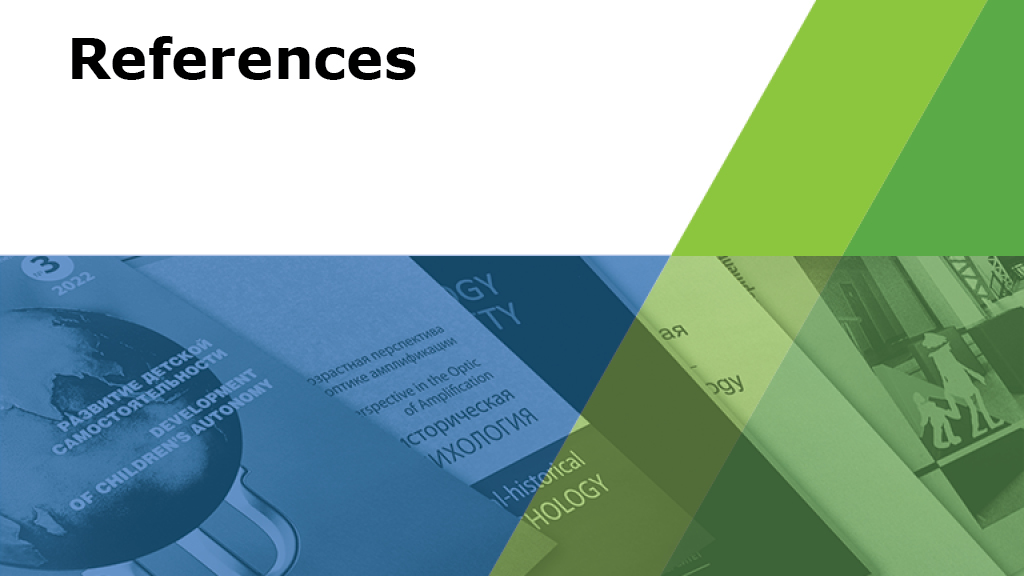- GOST 7.11-2004 System of Standards for Information, Librarianship and Publishing. Bibliographic Record. Abbreviation of Words and Word Combinations in Foreign European Languages. (2004). Moscow. URL: https://psyjournals.ru/files/staticpages/0/37/custom/librarians_SIBID_7112004.pdf (viewed: 10.09.2024).
- GOST R 7.0.12-2011 System of Standards for Information, Librarianship and Publishing. Bibliographic Record. Abbreviation of Words and Word Combinations in the Russian Language. General Requirements and Rules. (2011). Moscow. URL: https://psyjournals.ru/files/staticpages/0/37/custom/gost_r_7.0.12-2011.pdf (viewed: 10.09.2024).
- GOST R 7.0.7-2021 System of Standards for Information, Librarianship and Publishing. Articles in Journals and Collections. Publishing Design. (2021). Moscow. URL: https://psyjournals.ru/files/staticpages/0/37/custom/gost_r_7.0.7-2021.pdf (viewed: 10.09.2024).
- Kirillova, O.V. (2018). How to arrange an article and a scientific journal to avoid indexing errors in international scientometric databases. Science Editor and Publisher, 3(1–2), 52–72. (In Russ.). https://doi.org/10.24069/2542-0267-2018-1-2-52-72.
- Kirillova, O.V., & Popova, N.G. (Eds.). (2023). Ethics of scientific publication: Guidelines, standards and flowcharts Committee on Publication Ethics (COPE): Translated from English. Moscow: Association of Scientific Editors and Publishers. (In Russ.). https://doi.org/10.24069/ASEP-2023-ethics.
- Kochetkov, D.M., Popova, N.G., & Kochetkova, I.A. (2024). Contributorship collaboration: Translating the CRediT taxonomy into Russian. Science Editor and Publisher, 9(1), 38–43. (In Russ.). https://doi.org/10.24069/SEP-24-09.
- Kuleshova, A.V., Chekhovich, Yu.V., & Belenkaya, O.S. (2019). Walking the razor’s edge: How to avoid self-plagiarism when you recycle your texts. Science Editor and Publisher, 4(1–2), 45–51. (In Russ.). https://doi.org/10.24069/2542-0267-2019-1-2-45-51.
- Kulkarni, S., Rodrigues, V., & Joshi, Y. (2018). Research paper titles, abstracts and keywords as keys to successful publication: From Editage Insights blogs. Science Editor and Publisher, 3(1–2), 80–85. (In Russ.). https://doi.org/10.24069/2542-0267-2018-1-2-80-85.
- COPE Flowcharts and Infographics – General Approach to Publication Ethics for the Editorial Office. (2022). Science Editor and Publisher, 7(2), 221. (In Russ.). https://doi.org/10.24069/SEP-22-45.
- Oveshkova, A.N. (2023). Abstract writing in English: Translation issues and their solutions. Science Editor and Publisher, 8(1), 6–17. (In Russ.). https://doi.org/10.24069/SEP-23-01.
- Raitskaya, L.K., & Tikhonova, E.V. (2019). Reviews as a promising type of scholarly publication, its types and characteristics. Science Editor and Publisher, 4(3–4), 131–139. (In Russ.). https://doi.org/10.24069/2542-0267-2019-3-4-131-139.
- Tikhonova, E.V. (2024). Discussion of results in original research: Rhetorical moves and their implementation. Science Editor and Publisher, 9(1), 6–37. (In Russ.). https://doi.org/10.24069/SEP-24-14.
- Tikhonova, E.V., Popova, N.G., Kirillova, O.V., Dem’yanets, M.V., & Mzhel’skii, A.A. (2023). Preparing an article for publication in a reputable journal: Brief recommendations for authors and editors. Moscow: Association of Scientific Editors and Publishers. (In Russ.). https://doi.org/10.24069/rec-author-2023.
- Holcombe, A.O. (2020). Contributorship, not authorship: Use CRediT to indicate who did what. Science Editor and Publisher, 5(2), 123–134. (In Russ.). https://doi.org/10.24069/2542-0267-2020-2-123-134.
- American Psychological Association. (2020). Publication Manual of the American Psychological Association (7th ed.).Washington, DC: American Psychological Association. https://doi.org/10.1037/0000165-000.
← Previous | Contents |
